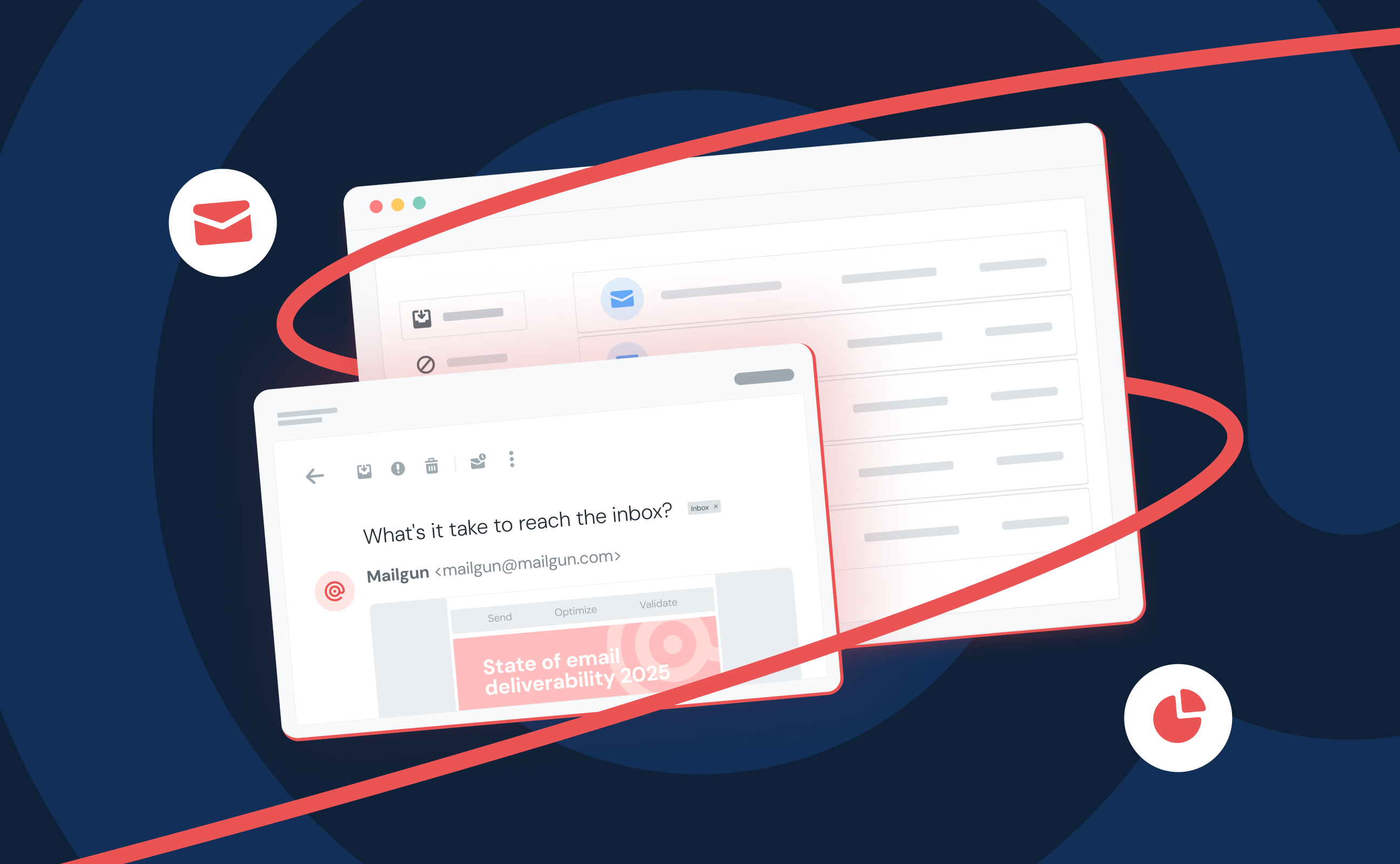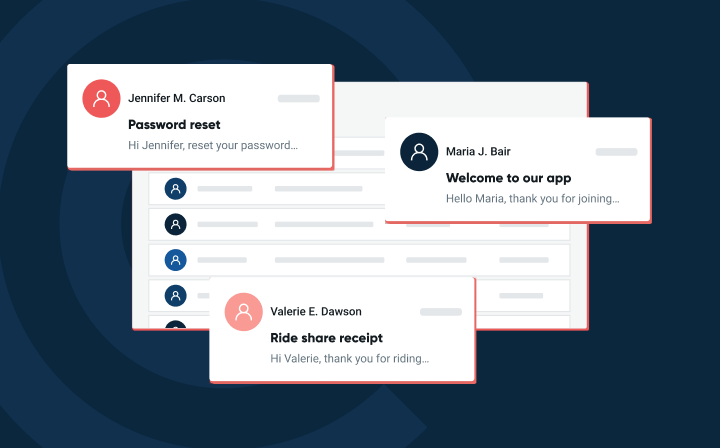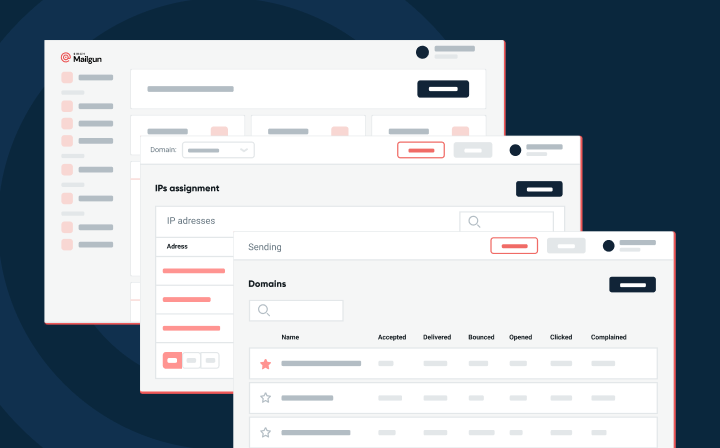Deliverability
Dedicated vs. Shared IPs: Knowing which one to use
Let’s break down if a dedicated or shared IP address is right for your email sending needs.
PUBLISHED ON
“They’re hacking our IP to access the mainframe!”
How often have we heard that line in movies as actors punch random keys and scramble to beat the clock?
Those scenes are highly implausible, technically questionable, and yet Hollywood magic at its best.
While you probably don’t have to worry about hackers targeting your Internet Protocol (IP) to access your mainframe, IP is an important component of your email campaigns. In this article, we’ll get you up to speed on dedicated vs. shared IPs, their benefits, which type of IP is better for your needs, and how to use them with Mailgun.
Table of contents
What are the benefits of using a dedicated IP address?
What are the benefits of using a shared IP address?
Table of contents
02Why should I care about IP addresses for sending emails?
03What are the differences between dedicated IPs and shared IPs?
04Which type of IP should you use?
05Wait, does the type of IP I use impact my SEO?
06What support does Mailgun offer for dedicated or shared IPs?
07What are the costs of shared vs. dedicated IPs on Mailgun?
What’s an IP address?
Let’s start from the top. An IP is an address assigned by your Internet Service Provider (ISP) that uniquely identifies your internet connection or a domain on the web. An IP address consists of a string of numbers separated by periods, like 216.58.211.206. Each number can range from 0 to 255.
When you connect to the internet, your ISP assigns you an external IP address to locate your computer or device. When your web browser requests a web page, it sends your external IP address along with it to identify you. You can mask your IP address by going through a proxy, like a VPN, that assigns you a proxy IP address.
On the other hand, web domains are identified by either a shared or dedicated IP address. We’ll focus on shared and dedicated IP addresses below, since these affect your email marketing campaigns and ecommerce shops.
Essentially, an IP address is an identifier on the internet. If you type in an IP address, you’ll be directed to a specific location on the internet. But it’s pretty difficult to memorize a bunch of numbers just to access a website, and that’s where the Domain Name System (DNS) steps in. DNS maps IP addresses onto alphanumeric domain names, like www.mailgun.com. Instead of typing in the IP address to navigate to a domain, we can just use its domain name.
Why should I care about IP addresses for sending emails?
Landing in the spam folder is the nemesis of email professionals. Having an excellent sender reputation goes a long way towards sticking that landing in the inbox.
Your sender reputation consists of your IP reputation and domain reputation. Internet service providers (ISP) use your sending IP’s past activity to determine whether or not you’re a trustworthy sender. As far as ISPs are concerned, trustworthy senders provide high-quality content and don’t act in a suspicious or spammy manner. If you don’t clear the bar, your emails might end up as spam or, worse, not be delivered at all.
Most mailbox providers don’t provide much transparency about how they perceive your IP or domain reputation, but you can use Google Postmaster Tools to gauge your score with Gmail. If you want more information, check out our other tips on email deliverability and how to manage your domain reputation.
What are the differences between dedicated IPs and shared IPs?
Since your IP reputation is closely tied to email deliverability, picking the proper IP setup to send your email campaigns can be the difference between the inbox and the spam folder.
As we mentioned above, there are two types of IPs: dedicated IPs and shared IPs. Here are their differences at a glance:
Dedicated IP addresses are only used by you. When you use a dedicated IP to send emails, your messages are sent from a unique and exclusive IP. As such, you have complete control over your email sender reputation and thus email deliverability.
Shared IP addresses are also used by other senders. When you use a shared IP to send emails, your messages are, of course, sent from an IP that is shared. You won’t have full control over your sender reputation and email deliverability. Instead, an email client pools all the sender reputation associated with your shared IP to determine deliverability. Usually, you’ll be grouped with similar-sized senders and businesses.
Let’s unpack the benefits of each type of IP address in the sections below.
What are the benefits of using a dedicated IP address?
The main draw for dedicated IPs is that you’re the sole user of the IP address and, as such, you have complete control over the IP.
The benefits for dedicated IPs include:
You have full control over your email sending reputation. You don’t have to worry if other senders on your IP are spammers who might bring down your IP reputation.
You can more easily pinpoint and fix IP issues. When several senders use an IP, it can be hard to figure out where an issue originated from and how to fix it. With a dedicated IP, you’re only maintaining your own sending behavior.
What are the benefits of using a shared IP address?
Shared IPs can be a great choice for smaller senders and/or groups of senders with good reputations.
The benefits for shared IPs include:
They’re more cost-effective than dedicated IPs. If you’re just starting to send email, it’s more financially feasible to use a shared IP until you have sufficient email volume.
Many other senders help improve the IP��’s health. Keeping an IP reputation squeaky clean can be a challenge, but shared IPs have other senders invested in keeping the IP in good shape.
You can benefit from other senders’ good reputations. If you’re a smaller or newer sender that shares an IP with well-regarded senders, you can benefit from the reputation and goodwill they’ve already built.
Which type of IP should you use?
Now that we’ve gotten the basics out of the way, let’s talk about which IP is best for you. Luckily, we’ve got a few recommendations for each one.
Use a dedicated IP if:
You’re a consistent high-volume sender. You can quickly build your reputation without help from other senders on the same IP by regularly sending many emails.
Your shared IP partners are giving the IP a bad reputation. It can be difficult to recover from a bad IP, and your efforts alone will most likely not balance out other senders’ shady activities.
You have a proven track record, and you can afford it. Dedicated IPs cost more than shared IPs, but it’s probably worth the cost.
Use a shared IP if:
You’re an inconsistent or low-volume sender.Your reputation will take longer to build with a low sending volume, and a shared IP can help legitimize a domain with a less static sending pattern.
Your shared IP partners have built a good reputation. You’ll be able to bask in that glow while your domain begins its journey.
You’re just starting out and have a small budget. Shared IPs are more cost-effective than dedicated IPs.
Wait, does the type of IP I use impact my SEO?
This one’s simple: No. Your SEO is not affected by the type of IP you use. Your SEO success is all yours.
According to Google’s webmaster guidelines, the real red flag is if your website is too similar to another. In other words, your content matters more than your IP address, as far as SEO is concerned.
What support does Mailgun offer for dedicated or shared IPs?
If you happen to be using a new dedicated IP or are making the switch from a shared IP, check out Mailgun’s IP warm-up service. We’ll help you prepare your IP for primetime, high-volume sending without actually having to manually warm things up.
Check out our email deliverability homepage to ensure your email campaigns land in the inbox. Don’t hesitate to get in touch if you need help with the sending and success of high-volume email campaigns.
What are the costs of shared vs. dedicated IPs on Mailgun?
Ready to get started? At Mailgun, we provide you with shared or dedicated IPs as part of our flexible email delivery service.
We have four different tiers, starting at $0/month on our Free plan. For users sending over 100k emails on any of our other plans, which start from $35/month, we provide a dedicated IP address. We also provide an IP pool for some of our plans. Check out our pricing details to see which plan is right for you.
In a nutshell
Now that we’ve covered both types of IPs, you’re aware of their benefits and when they should be used. Dedicated IPs – which are used by only you – are great for senders sending consistent high-volume email, and shared IPs – which are shared with other senders – are a smart choice for new and smaller senders looking to build their email platforms.
Ultimately, the right IP address for you depends on your email sending goals and needs. Next time you need an IP to get to a mainframe, shut down your runaway dinosaur park, or just send a few emails, and you’ll know which type of IP address is the best solution for you.
Don’t be a stranger: Let’s get you started with the right Mailgun plan today.







